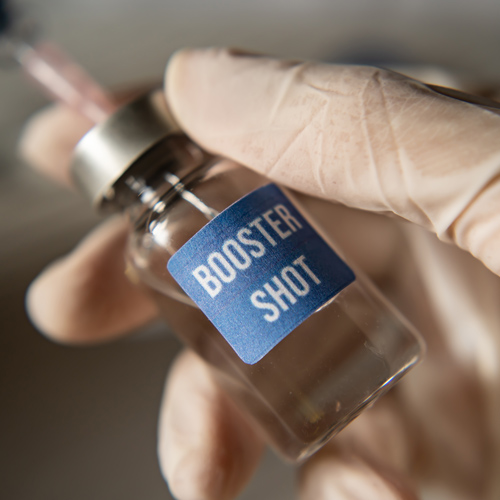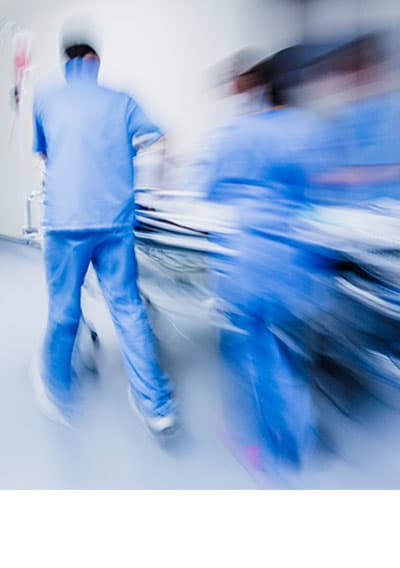Choosing Your COVID-19 Booster Shot
Three COVID-19 vaccines are authorized or approved for use in the United States to prevent COVID-19. Pfizer-BioNTech or Moderna (COVID-19 mRNA vaccines) are preferred. You may get Johnson & Johnson’s Janssen COVID-19 vaccine in some situations.
Who Can Get a Booster Shot
COVID-19 Booster Shot
| If You Received | Which Booster to Get? | When to Get a Booster? | Which Booster Should You Get? |
|---|---|---|---|
Pfizer-BioNTech | Everyone 12 years and older | At least 5 months after completing your primary COVID-19 vaccination series. |
|
Moderna | Adults 18 years and older | At least 5 months after completing your primary COVID-19 vaccination series. |
|
Johnson & Johnson's | Adults 18 years and older | At least 2 months after completing your J&J/Janssen COVID-19 vaccination series. |
|
*Although mRNA vaccines are preferred, J&J/Janssen COVID-19 vaccine may be considered in some situations
Schedule Your Booster Shot
COVID-19 Vaccines in San Bernardino County
For more information about San Bernardino County Vaccination Center, vaccine locations, and appointments visit:
sbcovid19.sbcounty.gov/vaccine
If you need help scheduling your booster shot, contact the location that set up your previous appointment. If you need to get your booster shot in a location different from where you received your previous shot, there are several ways you can find a vaccine provider.
What to Expect During and After Your Booster Shot Appointment
- Bring your CDC COVID-19 Vaccination Record card to your booster shot appointment so your provider can fill in the information about your booster dose. If you did not receive a card at your first appointment, contact the vaccination site where you got your first shot or your state health department to find out how you can get a card.
- You may experience side effects after getting a COVID-19 vaccine. These are normal signs that your body is building protection against COVID-19.
- Use v-safe to tell CDC about any side effects. If you enter your booster shot in your v-safe account, the system will send you daily health check-ins.
If You Were Vaccinated Outside of the United States
If you completed a Pfizer-BioNTech, Moderna, or J&J/Janssen COVID-19 vaccine primary series outside of the United States you should follow the guidance above for booster shots.
Otherwise, if you were vaccinated abroad with other COVID-19 vaccines you can get a booster shot if you are 16 years or older and you either:
- Received all the recommended doses of a World Health Organization emergency use listing (WHO-EUL) COVID-19 vaccineexternal icon, not approved or authorized by the U.S. Food and Drug Administration (FDA)
- Or completed a mix and match series composed of any combination of FDA-approved, FDA-authorized, or WHO-EUL COVID-19 vaccines
If you meet the above requirements you can get a single booster shot of Pfizer-BioNTech COVID-19 vaccine at least 6 months after getting all recommended doses or completing a mix and match COVID-19 vaccine series.
Data Supporting Need for a Booster Shot
Studies show after getting vaccinated against COVID-19, protection against the virus and the ability to prevent infection with variants may decrease over time and due to changes in variants.
- Although COVID-19 vaccines remain effective in preventing severe disease, recent data suggest their effectiveness at preventing infection or severe illness wanes over time, especially in people ages 65 years and older.
- The recent emergence of the Omicron variant further emphasizes the importance of vaccination, boosters, and prevention efforts needed to protect against COVID-19.
- Data from clinical trials showed that a booster shot increased the immune response in trial participants who finished a Pfizer-BioNTech or Moderna primary series 6 months earlier or who received a J&J/Janssen single-dose vaccine 2 months earlier. With an increased immune response, people should have improved protection against getting infected with COVID-19. For Pfizer-BioNTech and J&J/Janssen, clinical trials also showed that a booster shot helped prevent severe disease.
Frequently Asked Questions

Information gathered from CDC website.



